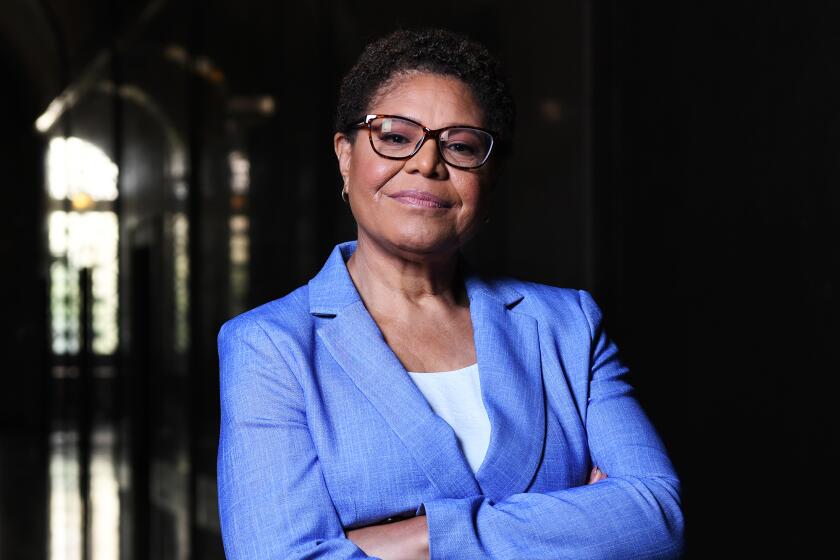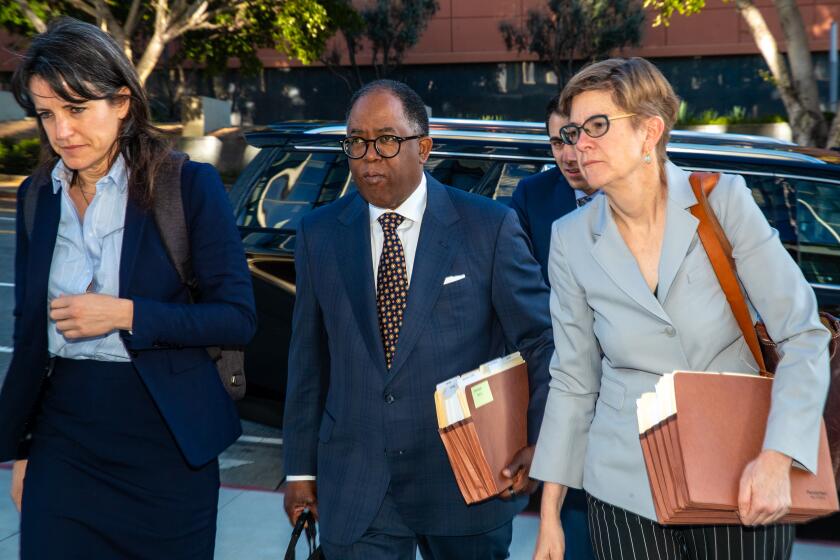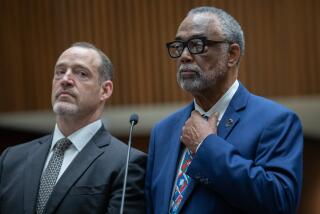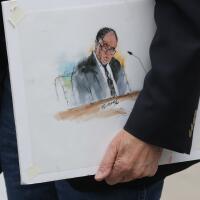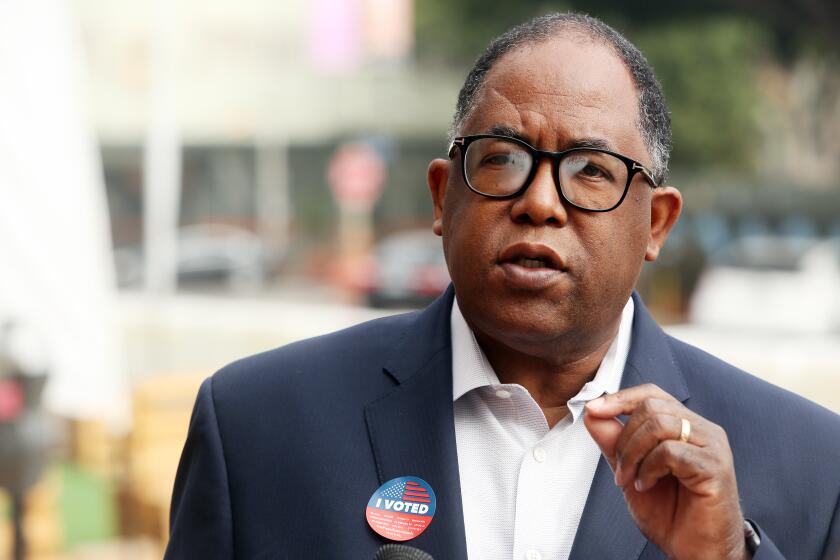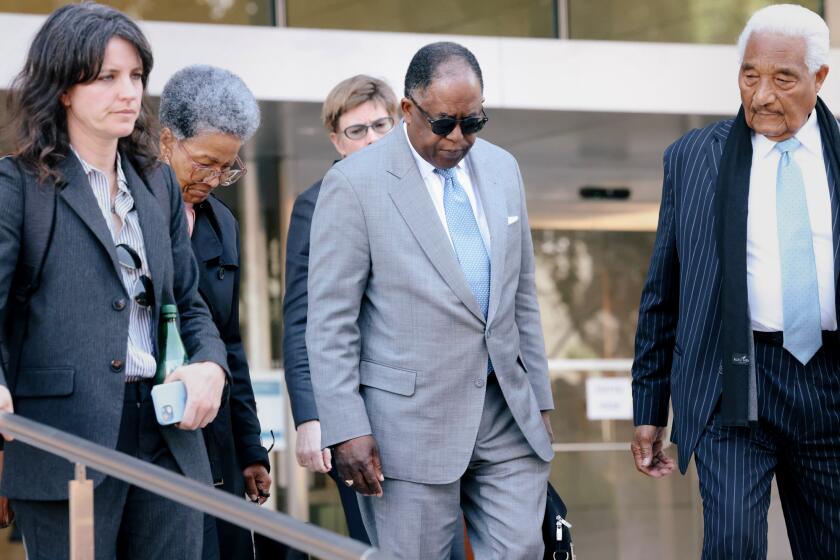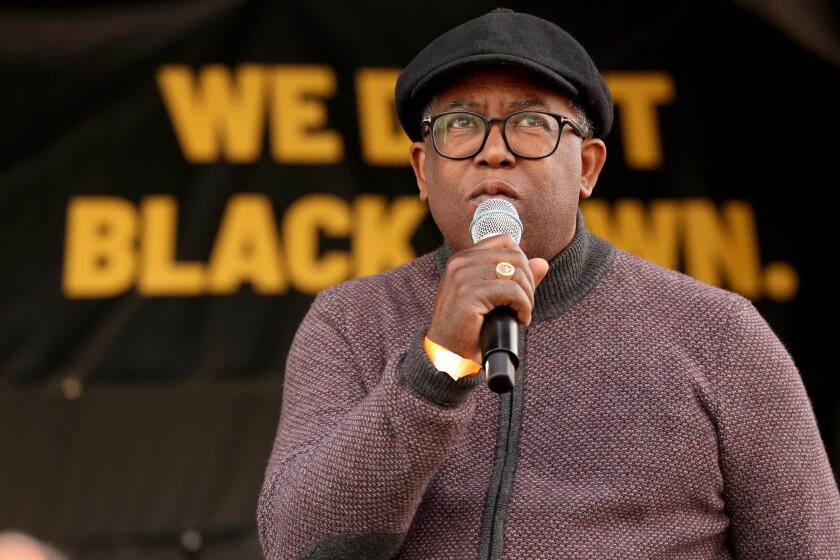Jury deliberations begin in Ridley-Thomas case that could land him in prison
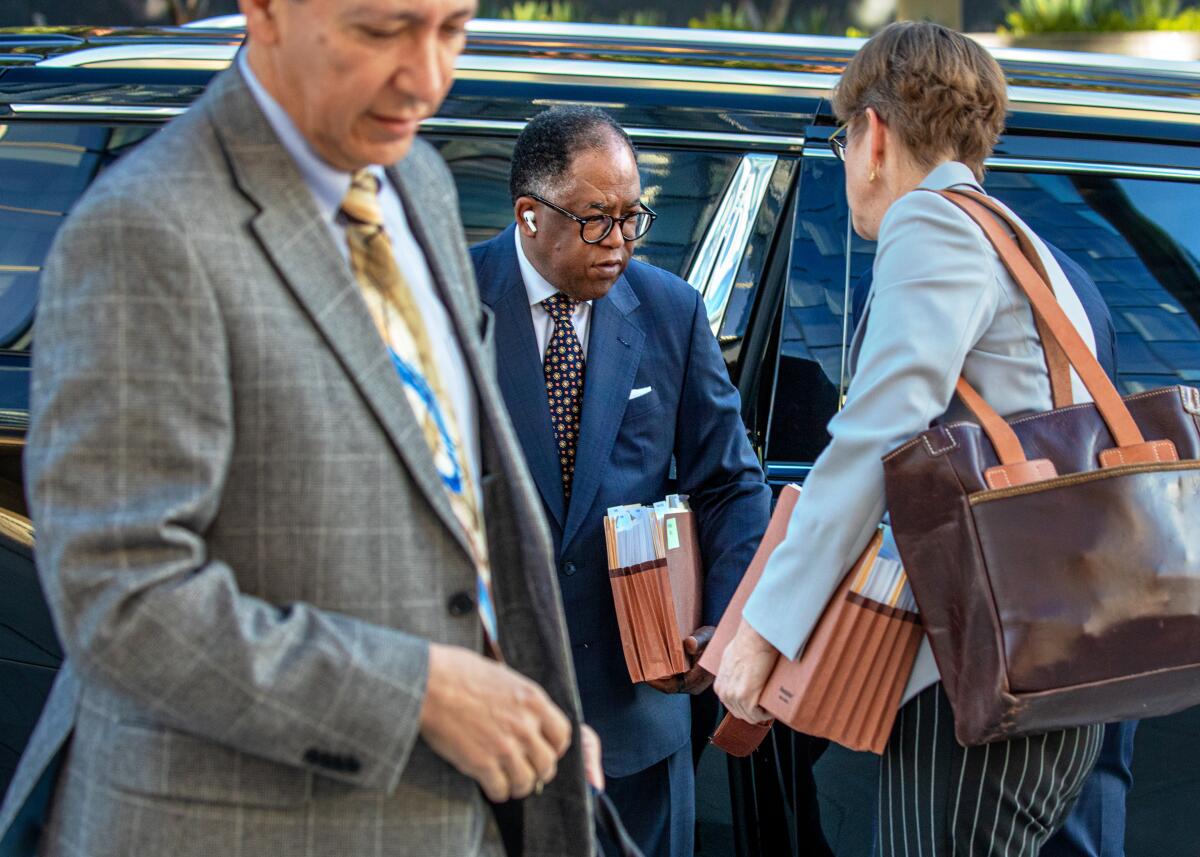
The trial of Mark Ridley-Thomas over the last two weeks offered ample evidence about the longtime Los Angeles County politicianâs close dealings with a USC dean.
From the words of Dean Marilyn Flynn, it is clear she was eager to secure business and partnerships with county government and made specific requests of Ridley-Thomas. Some of these requests closely mirror later motions at the county that Ridley-Thomas voted on, among other actions, and that benefited USC.
It is also not in dispute that Ridley-Thomasâ son Sebastian benefited from this relationship. Emails show that Flynn was instrumental in awarding a full-tuition scholarship to Sebastian before heâd even formally applied, hired him as a USC professor, and later accepted a $100,000 check from Ridley-Thomas days before sending the same amount of money to Sebastianâs nonprofit. At the time, Sebastian had resigned from his state Assembly seat amid a sexual harassment inquiry that would only become public much later.
The jury must now decide if all this amounted to a crime.
On Friday, a panel of 12 jurors drawn from a wide swath of Southern California began deliberating whether to convict Ridley-Thomas of 19 counts, including bribery and honest services mail and wire fraud as part of a corrupt conspiracy.
If found guilty, the 68-year-old lawmaker could spend years in federal prison â a shameful denouement to his political career.
The verdict also has far-reaching consequences in Los Angeles politics. If acquitted, Ridley-Thomas will return to his seat on the L.A. City Council after a 17-month suspension, ousting Heather Hutt, his districtâs appointed interim replacement. If convicted of some or all charges, his seat would be considered vacant â potentially leading to a special election or the reappointment of Hutt.
It remains to be seen whether the jury will find him a corrupt politician accepting handouts from a contractor or a concerned dad who took actions to help a troubled, ailing son.
Before the jury entered the deliberation room Friday, a federal prosecutor delivered a comprehensive rejoinder to Ridley-Thomasâ defense and urged the panel to assess the evidence âby the facts, the law, and common sense.â
âIt is not a defense that any actions taken were good for the community or were actions that the defendant would have taken [without a bribe],â Assistant U.S. Atty. Michael J. Morse said. Politicians do not get to monetize their office, he said.
âThe only question for you is: Was the defendant doing these things for Marilyn Flynn so that she would do things for him?â
The politician is accused of accepting bribes from Flynn for his son. In exchange, prosecutors say, he presented or voted on certain L.A. County agenda items and advised county officials to do certain acts regarding the issuing or amending of contracts.
The conspiracy charge accuses Flynn and Ridley-Thomas of the unlawful scheme to engage in fraud and bribery. Each of the 17 counts of honest services mail and wire fraud is tied to an email or FedEx sent in late 2017 or 2018 as part of the alleged scheme.
His co-defendant, Flynn, previously pleaded guilty to bribing Ridley-Thomas and is awaiting sentencing â but jurors have not been told during trial that she was charged or entered a guilty plea.
Ridley-Thomas did not testify in his defense. What his lawyers did offer, Morse said in his 90-minute rebuttal argument at the close of trial, was a number of âdistractions.â
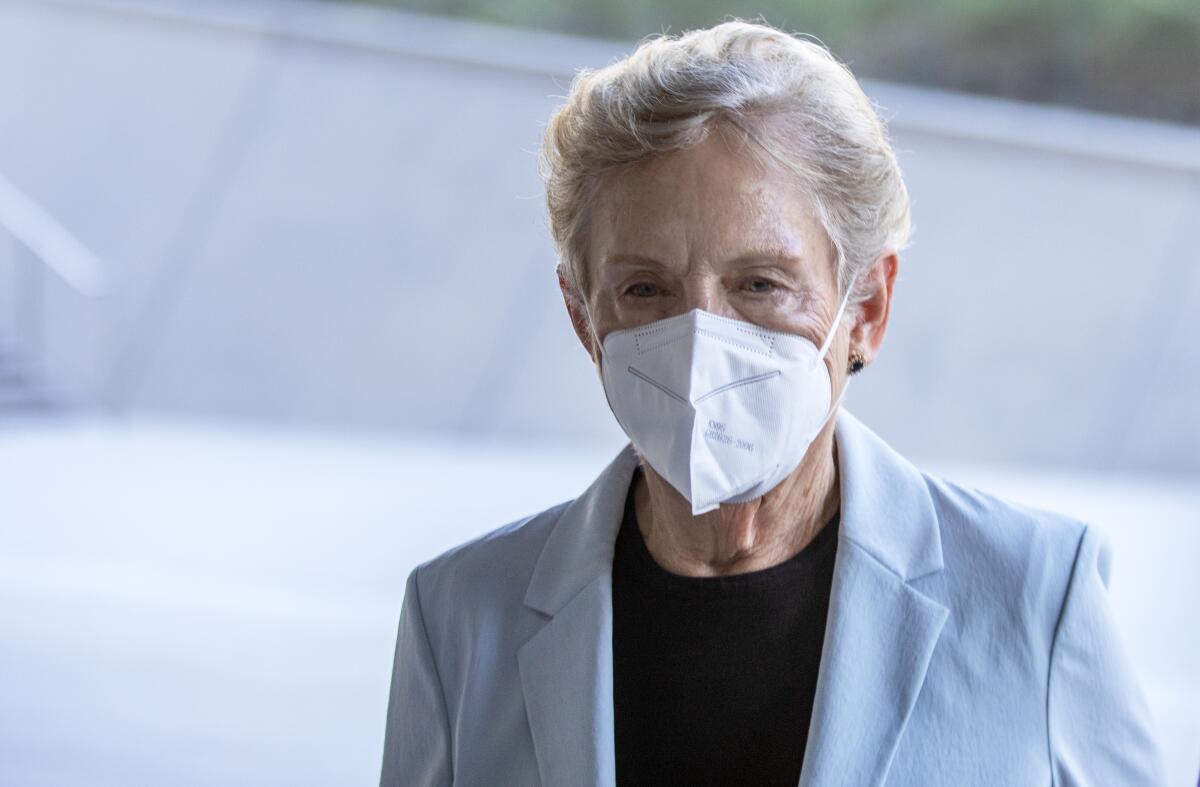
âThey want to make it about everything except the defendant,â he said. Among the red herrings: vilifying the lead investigator, FBI Special Agent Brian Adkins; casting aspersions at the motives of Flynnâs underlings who sounded the alarm about her dealings with the Ridley-Thomas family; suggesting that USC had cooked up a criminal referral into Ridley-Thomas to serve an unspecified institutional agenda; and putting Ridley-Thomasâ support for key county votes in the case as less about his actions and more as the near-predestined outcome of the Blue Ribbon Commission, a report that recommended how L.A. County could better serve at-risk children.
What was missing from Ridley-Thomasâ defense, he said, was a credible explanation for major episodes in the case, especially the $100,000 donation that was routed through USC.
Prosecutors say L.A. mayoral candidate Karen Bassâ scholarship and her dealings with USC are âcriticalâ to a case about corruption at the university.
On Thursday, Ridley-Thomasâ lawyer Daralyn Durie had told jurors that the $100,000 donationâs handling was more or less Flynnâs fault: She put the money in one bank account at USC, but the outgoing money that went to Sebastian Ridley-Thomasâ nonprofit came from another account at the university. In all of this, Durie said, her client was unaware.
âThat explanation completely ignores that all of this was done at the direction of the defendant,â Morse said, showing jurors the âshamâ donation letter he included with his check to USC.
Morse outlined the start of the alleged conspiracy: in May 2017, when Ridley-Thomas reaches out to Flynn seeking a phone call, leading the two to chat for 37 minutes. The next day, Sebastian Ridley-Thomas emailed Flynn, to which the dean replies: âI am glad to hear from you â and so quickly.â
The prosecutor emphasized what Flynn stood to gain: having one of the Board of Supervisorsâ most powerful members in her corner.
âFlynn wasnât the only one asking for things of the defendant,â Morse said. âShe needs to get to the front of the line. ... This is her ticket to the front of the line.â
Federal prosecutors and his defense attorney detailed sharply conflicting portraits of L.A. City Councilmember Mark Ridley-Thomas and the case against him.
Much of Ridley-Thomasâ defense depends on the idea that there was no chance of bribery â that the motions voted on by Ridley-Thomas were long-running policy goals that would inevitably come before the Board of Supervisors.
His lawyers brought in a slew of former aides and bold-faced names in local government, including former L.A. County CEO Sachi Hamai; Supervisor Janice Hahn; and former Supervisor Sheila Kuehl, each offering a view of the county programs as needed and devoid of controversy.
Morse, pointing to emails where Flynn makes noise about a âstalledâ amendment and other desired actions, asked why the dean was nevertheless pressing so hard for action: âIf the cake is baked, why is she still in the kitchen?â
In the timeline of the prosecution, December 2017 is critical. That month, Ridley-Thomasâ son, Sebastian, was facing the onset of the still-secret sexual harassment inquiry and his father feared for the damage of a #MeToo scandal in his own family, prosecutors argued. They point to emails among Ridley-Thomas and his PR and legal team that evince desperation for Sebastian to quietly exit the Legislature and find a prestigious landing spot.
On Dec. 14, Ridley-Thomas called the director of L.A. Countyâs mental health department and seconds later, shared the directorâs contact information with Flynn, writing, âHeâs ready to goâ â with a wink emoji. Less than an hour later, Flynn tells her staff that Sebastianâs admission â along with a scholarship â must be âthe highest priority.â That afternoon, one of Ridley-Thomasâ deputies introduces Flynn to the director of the countyâs child welfare agency, adding that her boss instructed her to connect the dean and the county official.
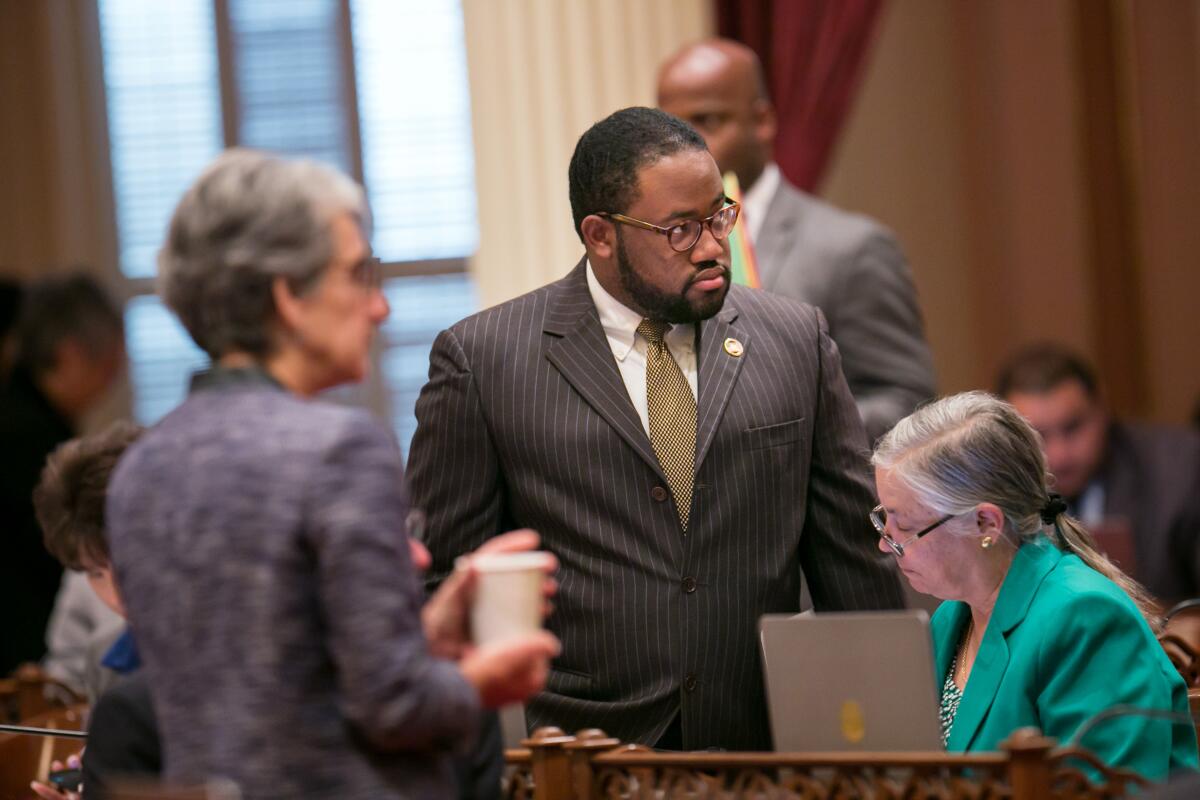
The following morning, Flynn tells a fellow USC dean to get Sebastianâs job offer out before the holidays â âto show MRT that we can deliver.â
âItâs good to be the son of one of the five kings and queens,â said the prosecutor, alluding to the moniker of the five-member Board of Supervisors and their control over a $30-billion budget.
The politicianâs lawyers began presenting their defense Tuesday, with Sebastian Ridley-Thomas center stage.
Defense attorneys have repeatedly sought to highlight the absence of L.A. County figures from the prosecutorsâ case, contending it was proof of an investigation that had blind spots. Morse argued it was the politicianâs former staffers and colleagues at L.A. County who had blind spots.
On cross-examination, the prosecutor said, their own replies showed they had scant insight into or awareness of Ridley-Thomasâ backroom communications with Flynn.
âThey were either loyalists of the defendant, or they were out of the loop â or both,â he said.
Times staff writer Julia Wick contributed to this report.
More to Read
Sign up for Essential California
The most important California stories and recommendations in your inbox every morning.
You may occasionally receive promotional content from the Los Angeles Times.
